10 may 2018
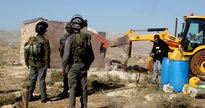
The Israeli Occupation Forces (IOF) supressed on Thursday a march in Bethlehem marking 70 years for the Palestinian uprooting from their homes and land, the Nakba.
Palestinians marched from Bethlehem city center to a hill overlooking the illegal Israeli settlement of Har Homa, built on Beit Sahour land north of Bethlehem, demanding their right to return to their homes they were force out from in the 1948 Arab-Israeli war that led to the creation of Israel and the start of the Palestinian refugee issue.
According to the PIC reporter, the protesters yelled slogans against Israeli occupation.
Soldiers stationed at the settlement fired tear gas, rubber bullets and stun grenades at the protesters, forcing them to disperse.
Palestinians marched from Bethlehem city center to a hill overlooking the illegal Israeli settlement of Har Homa, built on Beit Sahour land north of Bethlehem, demanding their right to return to their homes they were force out from in the 1948 Arab-Israeli war that led to the creation of Israel and the start of the Palestinian refugee issue.
According to the PIC reporter, the protesters yelled slogans against Israeli occupation.
Soldiers stationed at the settlement fired tear gas, rubber bullets and stun grenades at the protesters, forcing them to disperse.
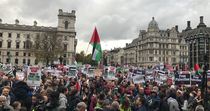
The Palestinian Forum in Britain said a massive protest rally would be organized outside the Israeli embassy in London in solidarity with the March of Return protesters in Gaza.
According to the forum, the demonstration will also be held to commemorate the 70th anniversary of the Palestinian Nakba (uprising) and to protest the upcoming relocation of the US embassy to Occupied Jerusalem.
The protest rally will be staged in cooperation with several pro-Palestine organizations and Muslim community groups.
According to the forum, the demonstration will also be held to commemorate the 70th anniversary of the Palestinian Nakba (uprising) and to protest the upcoming relocation of the US embassy to Occupied Jerusalem.
The protest rally will be staged in cooperation with several pro-Palestine organizations and Muslim community groups.

The Islamic Resistance Movement Hamas condemned in the strongest terms the British Crown Prince’s projected participation in an Israeli celebration marking the 70th anniversary of the establishment of Israeli occupation entity.
Hamas spokesman Fawzi Barhoum said: “By taking part in the Israeli event, Prince Charles turns a blind eye to the displacement and deportation of the Palestinian people, along with the heinous massacres perpetrated by Zionist gangs in 1948 and which were primarily green-lighted by the British government.”
“His participation will be a sign of Britain’s continuous complicity with the Israeli occupation against the Palestinian people”, the statement read. “The participation will certainly give the Israelis green light to continue its crimes and massacres against the Palestinian people, land, and holy sites.”
Hamas called on the Crown Prince to cancel his participation in order not to cause more pain to the people of Palestine and backtrack on the notorious Balfour Declaration, which led to the Nakba.
The movement also called upon the people of Britain to reject the visit, pressure the Prince to rescind his decision, and to speak up for the oppressed Palestinian people.
Hamas spokesman Fawzi Barhoum said: “By taking part in the Israeli event, Prince Charles turns a blind eye to the displacement and deportation of the Palestinian people, along with the heinous massacres perpetrated by Zionist gangs in 1948 and which were primarily green-lighted by the British government.”
“His participation will be a sign of Britain’s continuous complicity with the Israeli occupation against the Palestinian people”, the statement read. “The participation will certainly give the Israelis green light to continue its crimes and massacres against the Palestinian people, land, and holy sites.”
Hamas called on the Crown Prince to cancel his participation in order not to cause more pain to the people of Palestine and backtrack on the notorious Balfour Declaration, which led to the Nakba.
The movement also called upon the people of Britain to reject the visit, pressure the Prince to rescind his decision, and to speak up for the oppressed Palestinian people.
9 may 2018
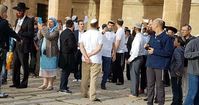
Israel’s alleged temple mount organizations have launched calls for stepping up sacrilegious break-ins at Jerusalem’s al-Aqsa Mosque—the third holiest site in Islam.
A hashtag reading “2,000 on the Jerusalem Day” has been launched by Israeli fanatics on the occasion of the so-called “reunification of Jerusalem”, referring to the day when Israel grabbed hold over the city following the notorious 1967 Six-Day War, which culminated in the displacement of thousands of Palestinians from their homes, in what is commonly referred to as the Nakba.
The Israeli organizations also distributed leaflets urging the Israeli masses to gradually intensify presence at al-Aqsa Mosque.
A hashtag reading “2,000 on the Jerusalem Day” has been launched by Israeli fanatics on the occasion of the so-called “reunification of Jerusalem”, referring to the day when Israel grabbed hold over the city following the notorious 1967 Six-Day War, which culminated in the displacement of thousands of Palestinians from their homes, in what is commonly referred to as the Nakba.
The Israeli organizations also distributed leaflets urging the Israeli masses to gradually intensify presence at al-Aqsa Mosque.
7 may 2018
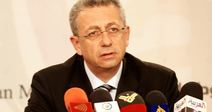
Secretary-General of the Palestinian National Initiative Mustafa al-Barghouti on Sunday called for a popular intifada in all Palestinian territories next week to mark the 70th anniversary of the Palestinian Nakba.
Al-Barghouti in press statements described the US administration's plan to move its embassy to Jerusalem on the anniversary of the 1948 Nakba as a "disgraceful act".
He added that the US administration's recognition of Jerusalem as Israel's capital is a participation in a grave violation of international law and a war crime that involves the annexation of an occupied territory by force.
He stressed that it is no possible for the Palestinians to let the US-Israeli scheme pass without confrontation, calling on the Palestinian Authority to act on the diplomatic level to stop this conspiracy.
Al-Barghouti in press statements described the US administration's plan to move its embassy to Jerusalem on the anniversary of the 1948 Nakba as a "disgraceful act".
He added that the US administration's recognition of Jerusalem as Israel's capital is a participation in a grave violation of international law and a war crime that involves the annexation of an occupied territory by force.
He stressed that it is no possible for the Palestinians to let the US-Israeli scheme pass without confrontation, calling on the Palestinian Authority to act on the diplomatic level to stop this conspiracy.
2 may 2018
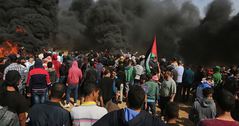
The Palestinian factions follow up committee in Gaza on Wednesday announced May 14 a day of general strike in response to the US decision to relocate its embassy from Tel Aviv to Occupied Jerusalem.
In a press statement, the factions stated that the general strike will include all institutions even the educational. But, it will exclude transportation for the transfer of the participants in the events which will be declared by the Higher National Committee of the Marches of Return and Breaking the Siege.
The statement also pointed out that the strike will also protest the international and the US UNRWA aid cuts.
The factions called on the Palestinians in the West Bank and in 1948 Occupied Palestine to take part in this big national day and urged them to massively take to the streets on May 14.
The Palestinian factions also asked Palestinians to escalate clashes with Israeli forces in all flash points in coincidence with the Great March of Return slated to be held on May 15 which marks the Palestinian Nakba Day.
In a press statement, the factions stated that the general strike will include all institutions even the educational. But, it will exclude transportation for the transfer of the participants in the events which will be declared by the Higher National Committee of the Marches of Return and Breaking the Siege.
The statement also pointed out that the strike will also protest the international and the US UNRWA aid cuts.
The factions called on the Palestinians in the West Bank and in 1948 Occupied Palestine to take part in this big national day and urged them to massively take to the streets on May 14.
The Palestinian factions also asked Palestinians to escalate clashes with Israeli forces in all flash points in coincidence with the Great March of Return slated to be held on May 15 which marks the Palestinian Nakba Day.
28 apr 2018
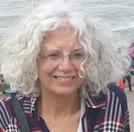
By Rima Najjar
During the time that Palestinians call The Great Rebellion or Revolt against British pro-Zionist policies in Palestine, 1936-1939, things began to go seriously wrong for Palestinian Arabs living in Jaffa and have continued to deteriorate with no reprieve yet.
Jaffa, at the time, was a major economic center in Palestine, a port and commercial hub. In the 19th century, Palestinian citrus farmers had introduced innovative grafting techniques to growing oranges, for which Jaffa is famous to this day – but with credit for its flourishing citrus industry going to Jewish usurpers rather than Palestinian Arabs.
In fact, the very existence of these Palestinian Arabs is often denied through Israel’s Zionist myth-making on hasbara sites.
By the 1930s, Jaffa’s flourishing citrus industry and exports had turned it into a major economic center, providing jobs for thousands and spurring the development of related economic sectors like banking, textiles, transportation, manufacturing, and tourism. Dubbed the Bride of the Sea, it was also a major cultural center.
The seeds of the Great Rebellion were sown when the League of Nations, in the “mandate” it issued to the British government over Palestine in 1922, included language facilitating European Jewish immigration to the country.
Life in Jaffa for Palestinians was affected in deeply horrific ways both during and after the Great Rebellion and during and after the Nakba of 1948, which Israel touts as “independence”, but which in reality is a conquest and colonization of Palestine by foreign forces, a fact that is ongoing to this day.
The bloody dispossession of Palestinians is referred to incorrectly and deceptively on the internet as a “civil war”. It’s what Google spits out in spades.
Palestinian Arabs naturally resented the massive foreign Jewish immigration that did, in fact, follow in Palestine in accordance with British mandate policies; they resisted the takeover of Palestine by the Jewish Zionist Movement, which was orchestrated from Europe.
Jaffa experienced a major violent disruption in 1936 when large sections (amounting to 220-240 buildings) of the Old City of Jaffa were blown up by the British military, ostensibly for “town-planning purposes”, but really as a punitive measure against the Palestinian rebellion.
Leaflets were dropped on Jaffa and its environs telling people to vacate their homes with the end result that 6,000 Palestinians were made homeless.
Life for these Palestinians during the Great Rebellion events deteriorated badly. There are many accounts of the devastating hardship of that time, including an account, for example, of a British policeman executing a Palestinian Arab in the Manshiya district of Jaffa, and of incidents of British troops robbing Palestinians – even children of their pocket money.
The Nakba events leading to the forcible establishment of Israel continued the destruction of the Palestinian social and economic matrix in Jaffa begun by the British as described above.
As early as the 1930s, myth-making depicting Palestine as a land empty of people was in progress.
“In the 1930s the Jewish painter Nahum Gutman painted a picture of the area between the Old Mosque in Jaffa and Tel Aviv as if it were empty, nothing but sand. He erased the Arab houses that were there from his vision, exemplifying the Zionist concept of an empty land, ignoring the Palestinians who actually lived there. In 1948 there were 100,000 inhabitants – Palestinian and Jewish – of Jaffa. Photos that show this do not appear in Israeli museums.”
In 1931, the population of Jaffa was 44,638 Palestinians (i.e., non-Jews) and 7,209 Palestinian Jews.
Under the 1947 UN Partition Plan, Jaffa was to be part of an Arab state. However, Jewish terrorist forces (the Irgun) and Haganah militia mounted a siege on Jaffa, effectively cutting it off from the rest of Palestine, and indiscriminately shelled the Palestinian population with mortars for four days and nights in April 1948.
Israeli research such as that by Amiram Gonen speaks of the emergence of “a geographic heartland” after the Nakba in Jaffa and Tel Aviv.
But the fact is, after the establishment of Israel as a Jewish state on a partitioned Palestine in 1948, life in Jaffa for a huge number of Palestinians became non-existent, for the simple reason that they were forced out of the city and denied return. The British tried to protect Palestinian Arabs from being evicted in Jaffa and failed, handing over their military bases to Zionist forces.
Today, Jaffa refugees and exiles are scattered in the West Bank and all over the world, but they haven’t forgotten the life they lived there before the Nakba.
As one example, as much as 80% of the population of Balata refugee camp in the West Bank, east of Nablus, is originally from Jaffa. It is a camp meant to hold 5000 refugees but is now more than 27,200 Palestinians strong and is known as a symbol of resistance.
Only 30% of the population of Jaffa today is Palestinian Arab. It is a story worth retelling and remembering repeatedly because it continues to be buried under an avalanche of Israeli hasbara.
“The expulsion of the Palestinians – not merely the fighters but the civilians – had been well prepared. Throughout the 1930s and 40s, dossiers on all the Palestinian villages had been meticulously compiled by Zionist militias and stored in the files of the Haganah (the Zionist military organization that operated during the time of the British mandate, 1921-48, after which it formed the basis of the IDF). These files can still be consulted today in the Haganah archives (see Pappe, Ethnic Cleansing, passim).
“The Haganah sent spies into the villages, where they availed themselves of the Arab hospitality offered them and, under the pretext of concern for the wellbeing of their hosts, inquired about the number of animals and the amount of land each family owned. This information came in useful when half the villages of Palestine were destroyed in the Nakba. No doubt it also formed a database for the ‘Great Book Robbery’ that took place at the same time, when 70,000 volumes were stolen from well-to-do Palestinian homes and from mosques, some of them to be pulped as being ‘hostile’ to the new Israeli state, and others ending up in the National Library with ‘AP’ (abandoned property) embossed on their spines.”
For those Palestinians who remain, life in Jaffa today, as Sami Abu Shehadeh and Fadi Shbaytah write below, is grim:
“The story of Jaffa’s ongoing Nakba is the story of the transformation of this thriving modern urban center into a marginalized neighborhood suffering from poverty, discrimination, gentrification, crime, and demolition since the initial wave of mass expulsion in 1948 to the present day.”
The life of Palestinians in Jaffa (and other Palestinian cities and towns) during the British Mandate has been documented (and illustrated through photographs from the time) in a wonderful book edited by historian Walid Khalidi titled ‘Before their Diaspora.”
[For those interested in this topic, Khalidi’s book has been made available online for free by The Institute for Palestine Studies]
– Rima Najjar is a Palestinian whose father’s side of the family comes from the forcibly depopulated village of Lifta on the western outskirts of Jerusalem. She is an activist, researcher and retired professor of English literature, Al-Quds University, occupied West Bank. Her article appeared in Palestine Chronicle.
During the time that Palestinians call The Great Rebellion or Revolt against British pro-Zionist policies in Palestine, 1936-1939, things began to go seriously wrong for Palestinian Arabs living in Jaffa and have continued to deteriorate with no reprieve yet.
Jaffa, at the time, was a major economic center in Palestine, a port and commercial hub. In the 19th century, Palestinian citrus farmers had introduced innovative grafting techniques to growing oranges, for which Jaffa is famous to this day – but with credit for its flourishing citrus industry going to Jewish usurpers rather than Palestinian Arabs.
In fact, the very existence of these Palestinian Arabs is often denied through Israel’s Zionist myth-making on hasbara sites.
By the 1930s, Jaffa’s flourishing citrus industry and exports had turned it into a major economic center, providing jobs for thousands and spurring the development of related economic sectors like banking, textiles, transportation, manufacturing, and tourism. Dubbed the Bride of the Sea, it was also a major cultural center.
The seeds of the Great Rebellion were sown when the League of Nations, in the “mandate” it issued to the British government over Palestine in 1922, included language facilitating European Jewish immigration to the country.
Life in Jaffa for Palestinians was affected in deeply horrific ways both during and after the Great Rebellion and during and after the Nakba of 1948, which Israel touts as “independence”, but which in reality is a conquest and colonization of Palestine by foreign forces, a fact that is ongoing to this day.
The bloody dispossession of Palestinians is referred to incorrectly and deceptively on the internet as a “civil war”. It’s what Google spits out in spades.
Palestinian Arabs naturally resented the massive foreign Jewish immigration that did, in fact, follow in Palestine in accordance with British mandate policies; they resisted the takeover of Palestine by the Jewish Zionist Movement, which was orchestrated from Europe.
Jaffa experienced a major violent disruption in 1936 when large sections (amounting to 220-240 buildings) of the Old City of Jaffa were blown up by the British military, ostensibly for “town-planning purposes”, but really as a punitive measure against the Palestinian rebellion.
Leaflets were dropped on Jaffa and its environs telling people to vacate their homes with the end result that 6,000 Palestinians were made homeless.
Life for these Palestinians during the Great Rebellion events deteriorated badly. There are many accounts of the devastating hardship of that time, including an account, for example, of a British policeman executing a Palestinian Arab in the Manshiya district of Jaffa, and of incidents of British troops robbing Palestinians – even children of their pocket money.
The Nakba events leading to the forcible establishment of Israel continued the destruction of the Palestinian social and economic matrix in Jaffa begun by the British as described above.
As early as the 1930s, myth-making depicting Palestine as a land empty of people was in progress.
“In the 1930s the Jewish painter Nahum Gutman painted a picture of the area between the Old Mosque in Jaffa and Tel Aviv as if it were empty, nothing but sand. He erased the Arab houses that were there from his vision, exemplifying the Zionist concept of an empty land, ignoring the Palestinians who actually lived there. In 1948 there were 100,000 inhabitants – Palestinian and Jewish – of Jaffa. Photos that show this do not appear in Israeli museums.”
In 1931, the population of Jaffa was 44,638 Palestinians (i.e., non-Jews) and 7,209 Palestinian Jews.
Under the 1947 UN Partition Plan, Jaffa was to be part of an Arab state. However, Jewish terrorist forces (the Irgun) and Haganah militia mounted a siege on Jaffa, effectively cutting it off from the rest of Palestine, and indiscriminately shelled the Palestinian population with mortars for four days and nights in April 1948.
Israeli research such as that by Amiram Gonen speaks of the emergence of “a geographic heartland” after the Nakba in Jaffa and Tel Aviv.
But the fact is, after the establishment of Israel as a Jewish state on a partitioned Palestine in 1948, life in Jaffa for a huge number of Palestinians became non-existent, for the simple reason that they were forced out of the city and denied return. The British tried to protect Palestinian Arabs from being evicted in Jaffa and failed, handing over their military bases to Zionist forces.
Today, Jaffa refugees and exiles are scattered in the West Bank and all over the world, but they haven’t forgotten the life they lived there before the Nakba.
As one example, as much as 80% of the population of Balata refugee camp in the West Bank, east of Nablus, is originally from Jaffa. It is a camp meant to hold 5000 refugees but is now more than 27,200 Palestinians strong and is known as a symbol of resistance.
Only 30% of the population of Jaffa today is Palestinian Arab. It is a story worth retelling and remembering repeatedly because it continues to be buried under an avalanche of Israeli hasbara.
“The expulsion of the Palestinians – not merely the fighters but the civilians – had been well prepared. Throughout the 1930s and 40s, dossiers on all the Palestinian villages had been meticulously compiled by Zionist militias and stored in the files of the Haganah (the Zionist military organization that operated during the time of the British mandate, 1921-48, after which it formed the basis of the IDF). These files can still be consulted today in the Haganah archives (see Pappe, Ethnic Cleansing, passim).
“The Haganah sent spies into the villages, where they availed themselves of the Arab hospitality offered them and, under the pretext of concern for the wellbeing of their hosts, inquired about the number of animals and the amount of land each family owned. This information came in useful when half the villages of Palestine were destroyed in the Nakba. No doubt it also formed a database for the ‘Great Book Robbery’ that took place at the same time, when 70,000 volumes were stolen from well-to-do Palestinian homes and from mosques, some of them to be pulped as being ‘hostile’ to the new Israeli state, and others ending up in the National Library with ‘AP’ (abandoned property) embossed on their spines.”
For those Palestinians who remain, life in Jaffa today, as Sami Abu Shehadeh and Fadi Shbaytah write below, is grim:
“The story of Jaffa’s ongoing Nakba is the story of the transformation of this thriving modern urban center into a marginalized neighborhood suffering from poverty, discrimination, gentrification, crime, and demolition since the initial wave of mass expulsion in 1948 to the present day.”
The life of Palestinians in Jaffa (and other Palestinian cities and towns) during the British Mandate has been documented (and illustrated through photographs from the time) in a wonderful book edited by historian Walid Khalidi titled ‘Before their Diaspora.”
[For those interested in this topic, Khalidi’s book has been made available online for free by The Institute for Palestine Studies]
– Rima Najjar is a Palestinian whose father’s side of the family comes from the forcibly depopulated village of Lifta on the western outskirts of Jerusalem. She is an activist, researcher and retired professor of English literature, Al-Quds University, occupied West Bank. Her article appeared in Palestine Chronicle.
25 apr 2018
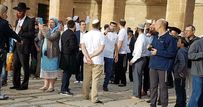
Israel’s alleged Temple Mount organizations have launched calls for mass break-ins into Jerusalem’s Al-Aqsa Mosque—the third holiest site in Islam—on May 13.
Leaflets circulated on social media networks by the Temple Mount groups urged Israeli settlers to collectively defile al-Aqsa Mosque on the so-called "Jerusalem Day", in reference to the day when Israel occupied the eastern part of Jerusalem city.
Last year, similar break-ins carried out by Israel’s settler hordes into al-Aqsa fueled tension across the occupied Palestinian territories.
Over recent days, Israeli police stepped up crackdowns against the Muslim guards and staff at al-Aqsa Mosque, banning at least six from the site for periods ranging from 15 days to six months.
May 30, 2018, marks the 51st anniversary of Israel’s takeover of Jerusalem’s eastern part following the 1967 war, known as the Naksa Day, as it has resulted in the displacement of thousands of Palestinians from their homes.
Leaflets circulated on social media networks by the Temple Mount groups urged Israeli settlers to collectively defile al-Aqsa Mosque on the so-called "Jerusalem Day", in reference to the day when Israel occupied the eastern part of Jerusalem city.
Last year, similar break-ins carried out by Israel’s settler hordes into al-Aqsa fueled tension across the occupied Palestinian territories.
Over recent days, Israeli police stepped up crackdowns against the Muslim guards and staff at al-Aqsa Mosque, banning at least six from the site for periods ranging from 15 days to six months.
May 30, 2018, marks the 51st anniversary of Israel’s takeover of Jerusalem’s eastern part following the 1967 war, known as the Naksa Day, as it has resulted in the displacement of thousands of Palestinians from their homes.
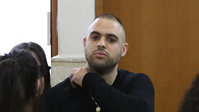
Ben Deri
Ben Deri, who was convicted of negligent homicide after shooting dead 17-year-old Nadim Nuwara during Nakba Day clashes in Beitunia four years ago, gets prison time, ordered to pay NIS 50,000 in compensation to family under plea deal.
Border Policeman Ben Deri, who was convicted of the negligent homicide of 17-year-old Nadim Nuwara during Nakba Day clashes in Beitunia four years ago, was sentenced to nine months in prison on Wednesday.
The Jerusalem District Court also ordered Deri to pay the Palestinian teen's family NIS 50,000 in compensation.
Because the sentence includes time served, Deri will only have to spend seven months in prison.
Ben Deri, who was convicted of negligent homicide after shooting dead 17-year-old Nadim Nuwara during Nakba Day clashes in Beitunia four years ago, gets prison time, ordered to pay NIS 50,000 in compensation to family under plea deal.
Border Policeman Ben Deri, who was convicted of the negligent homicide of 17-year-old Nadim Nuwara during Nakba Day clashes in Beitunia four years ago, was sentenced to nine months in prison on Wednesday.
The Jerusalem District Court also ordered Deri to pay the Palestinian teen's family NIS 50,000 in compensation.
Because the sentence includes time served, Deri will only have to spend seven months in prison.
has been treating Deri?" the father wondered.
"I lost my son, and I turned to the law... but I was surprised that after all of the evidence we submitted, the decision in the end was to convict of negligent homicide, and this caused a lot of problems for us. I'm asking that justice is served just once. At the end of the day, this is about killing innocent children," he continued.
Deri's attorney, Zion Amir, said following the sentencing that he was happy his client was cleared of the manslaughter charge, but he came out against the fact soldiers are prosecuted in such circumstances.
"I lost my son, and I turned to the law... but I was surprised that after all of the evidence we submitted, the decision in the end was to convict of negligent homicide, and this caused a lot of problems for us. I'm asking that justice is served just once. At the end of the day, this is about killing innocent children," he continued.
Deri's attorney, Zion Amir, said following the sentencing that he was happy his client was cleared of the manslaughter charge, but he came out against the fact soldiers are prosecuted in such circumstances.

